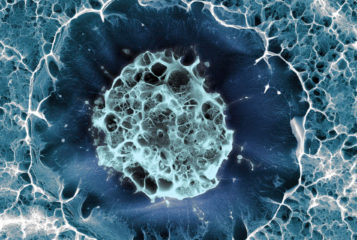Medical
research involving animals that contain human material (ACHM) raises new
ethical concerns and should be more tightly regulated, warns a new report by
the Academy of Medical Sciences.
It
recommends that the creation of embryos that are 'predominantly animal' but contain some human cells should
be restricted and a national expert body
should be established to oversee and regulate ACHM research.
An expert
working group, chaired by Martin Bobrow, Professor Emeritus of medical genetics at the University of
Cambridge, said research should be banned if it involves the creation of
animals with complex cognitive abilities, human-like behaviour, or
characteristics such as self-awareness, reasoning and language that would raise
their moral status to that of the great apes or humans.
'This is a
complex research area and there should be ongoing dialogue between scientists,
regulators and the wider public to address emerging issues', said Professor Bobrow. 'Our report
recommends that the Home Office puts in place a national expert body, within
the existing stringent system of animal research regulation, to provide
specific advice on sensitive types of ACHM research'.
Research
involving ACHM includes the creation of animals that have had human DNA sequences or human cells incorporated into them. The animals are primarily used to study
human diseases and to develop new therapeutic products. Most of this research
involves mice, as well as fruit flies, zebra fish, rats, sheep and goats.This type of research is not new, and the majority is already adequately
regulated in the UK, the report says. But the working group also considered potential types of future
research that might transgress ethical boundaries.
'If you
start putting very large numbers of human brain cells into primates, suddenly
you might transform primates into something that has some of the capacities
that we regard as distinctively human', said Professor Tom Baldwin, a philosopher at the University of
York and member of the working group. 'These possibilities, at the moment, are
largely being explored in fiction but we need to start thinking about them
now'.
Research
that involves the creation of embryos containing a mixture of human and
non-human primate cells should also be banned, the report recommends. At
present, human embryos containing animal cells are not allowed to develop
beyond 14 days under UK law. No similar
regulation exists for embryos that are 'predominantly animal' but contain some
human cells, and the report recommends that this should be restricted. The breeding of animals that can produce human sperm or egg cells should also
be restricted, in order to prevent the creation of human-animal hybrids,
the report states.
An Ipsos
MORI study commissioned by the working group found that the public were largely
supportive of most types of ACHM research. For the most part the respondents
did not perceive it to be significantly different from animal research, and
were mainly concerned about animal welfare.
Starting an
open and inclusive dialogue is important, said Professor Robin Lovell-Badge, a
member of the expert working group and developmental biologist at the National
Institute of Medical Research in London. 'We don't want scientists to cause
problems for the future by overstepping the mark of what is publicly
acceptable'.
Sources and References
-
Beware 'Planet of the Apes' experiments that could create sci-fi nightmare
-
Animals containing human material
-
Animals with human DNA
-
New report examines the use of animals containing human material in biomedical research
-
http://www.nature.com/news/2011/110721/full/475438a.html
-
UK scientists call for new agency to oversee experiments mixing human and animal cells






Leave a Reply
You must be logged in to post a comment.